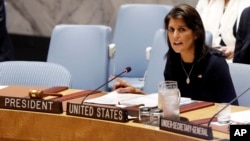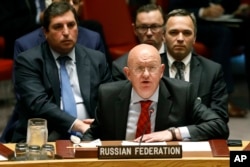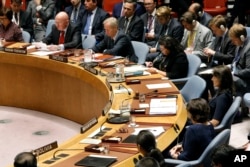U.S. Ambassador to the United Nations Nikki Haley accused Russia of “cheating” on international sanctions against North Korea, saying Moscow is undermining U.S. efforts to denuclearize the Korean peninsula.
“Russian corruption is like a virus,” Haley told a meeting of the U.N. Security Council on Monday. “It is impeding our ability to achieve complete denuclearization in North Korea.”
Haley said she was upset about a report from the independent experts who monitor U.N. sanctions implementation. The United States had provided evidence to the experts of Russian violations, but the report presented to council members omitted the Russian violations.
“Apparently, Russia threatened to prevent release of the report unless its demand to hide the evidence of its violations was met,” the U.S. ambassador said. “To our deep regret, the panel agreed.”
Haley said the United States had no choice but to prevent publication of “the tainted report.”
“The difficult, very sensitive talks with North Korea are ongoing,” Haley told council members. “The Trump-Kim summit has set us on a path toward complete denuclearization, but we are not there yet. And until we get there, we must not ease the powerful worldwide sanctions that are in place.” U.S. and North Korean leaders met on June 12 in Singapore and agreed to that the North would dismantle its nuclear program.
Haley said Moscow has systematically violated U.N. sanctions, particularly on oil exports, allowing Russian flagged vessels to transfer petroleum products to North Korean tankers on the high seas. Since January, Haley said the U.S. has tracked at least 148 instances of such transfers.
“We estimate that, at least, North Korea has obtained over 800,000 barrels of refined petroleum products in the first eight months of this year,” the U.S. ambassador noted. “That’s 160 percent of the 2018 annual cap of 500,000. In reality, we think they have obtained four times the annual quota in the first 8 months of this year.”
Russia’s U.N. envoy dismissed the U.S. accusations, saying it was Washington that sought to interfere with the work of the panel, not Moscow.
“The work of the panel of experts -- which because of decisions beyond our control became increasing politicized -- they became ultimately the hostages to the vision of Washington,” Vassily Nebenzia said.
The Russian ambassador said the panel’s first version of the report did not meet the committee’s standards of objectivity and impartiality and that Moscow, as well as some other council members, submitted comments to the panel that “were viewed correctly by the experts and then taken on board” when they sent their final report to the council.
In fact, Nebenzia countered, it is not Moscow that is pressuring the experts, but Washington.
“Aren’t you the ones who are exerting direct pressure on the group demanding that they change their opinion in their report that they will convey to the Security Council?” Nebenzia asked. He said Washington is treating the sanctions committee as a “sledgehammer” to punish Pyongyang for its intransigence.
While he offered simple explanations to refute each of the U.S. accusations, he did not explicitly state that Russia is enforcing the sanctions. And he recommended that the sanctions committee ease sanctions through special temporary exemptions for inter-Korean projects.
Other council members reiterated the importance of Security Council unity and maintaining pressure through sanctions implementation.
In the region, the leaders of South and North Korea are continuing their engagement and are to meet for a third time on Tuesday.
“The summit is expected to add renewed energy to the current diplomatic process,” South Korean’s U.N. Ambassador Cho Tae-yul told the council. “We hope and expect that a significant breakthrough can be made during the summit meeting in Pyongyang, which in turn will help resume the stalled U.S.-DPRK negotiations.” DPRK is the abbreviation for North Korea’s full name.
Also during Monday's meeting, the U.N.’s political chief, Rosemary DiCarlo, told the Security Council there continue to be signs that North Korea “is maintaining and developing” its nuclear and ballistic missile programs.
“The International Atomic Energy Agency remains unable to access the DPRK and verify the correctness and completeness of the DPRK’s declarations under its safeguards agreement,” DiCarlo said referring to the U.N. nuclear watchdog agency.







